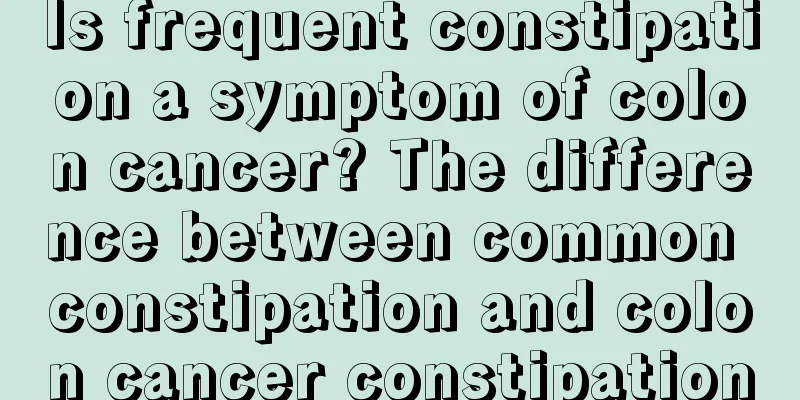Is frequent constipation a symptom of colon cancer? The difference between common constipation and colon cancer constipation

|
Is frequent constipation a symptom of colorectal cancer? This is a common question, and many people are confused about the relationship between constipation and colorectal cancer. Before answering this question, we need to understand the difference between ordinary constipation and colorectal cancer constipation. Common constipation refers to a significant decrease in the number of bowel movements, or difficulty in defecation, dry stool, prolonged defecation time, etc. It is usually caused by the following reasons: unscientific diet, irregular living habits, lack of exercise, etc. Compared with ordinary constipation, bowel cancer constipation has distinct characteristics. The following points will help us distinguish between the two: 1. Persistent constipation: Generally speaking, constipation caused by colorectal cancer is persistent, while ordinary constipation may be relieved after changing eating habits or making other appropriate adjustments. 2. Changing stool characteristics: The stool shape of bowel cancer constipation usually changes significantly, and may appear as long and thin strips of stool, or dry and hard stool similar to sheep dung. The stool characteristics of ordinary constipation are relatively consistent. 3. Associated symptoms: Constipation caused by colorectal cancer is usually accompanied by other symptoms, such as abdominal distension and pain, discomfort during defecation, weight loss, etc. However, ordinary constipation generally has no obvious associated symptoms. However, it should be made clear that the symptom of constipation alone cannot confirm whether you have colon cancer. Further medical examinations are needed, such as colonoscopy, CT scan, etc. How to prevent and relieve common constipation? 1. Balanced diet: Develop regular eating habits and consume enough dietary fiber, such as vegetables, fruits and whole grains. 2. Moderate exercise: Maintain moderate physical exercise to increase intestinal motility and promote defecation. 3. Establish regular bowel movement: Develop the habit of regular bowel movements to maintain bowel regularity. Although frequent constipation is not necessarily a sign of colon cancer, we can also prevent colon cancer by reducing constipation and maintaining good bowel habits and lifestyle. In daily life, we should pay attention to our bowel movements. When the symptoms of constipation last for more than a week and are accompanied by other abnormal symptoms, it is best to consult a doctor for further examination and evaluation. In short, frequent constipation is not necessarily a sign of colorectal cancer, but there are differences in the symptoms of colorectal cancer constipation and ordinary constipation. Maintaining a good diet and lifestyle, and regular physical and intestinal examinations are important steps to prevent and reduce the risk of colorectal cancer. |
Recommend
Reasons for having no appetite in the morning
Some of your friends may have no appetite when th...
How to make pickled water spinach stems
There are relatively few leaves of water spinach,...
The harm of dichloromethane to human body
The rapid development of science and technology i...
Which hospital is good at treating skin cancer
In recent years, with the development of society ...
What should I eat after kidney removal for kidney cancer
As a malignant tumor, kidney cancer generally has...
Bilateral breast glandular density
There are differences between women's breasts...
What causes lymphoma?
Lymphoma is a malignant tumor that mostly occurs ...
Where does prostate cancer usually manifest itself?
Prostate cancer is a disease with a higher incide...
What to do if you see things blurry
The blind will never be able to understand the wo...
What are the early symptoms of pituitary tumors in women
Although most pituitary tumors in women are benig...
How to wash a silk quilt, this is the best way to maintain it
Silk quilts are something that every family uses....
How to check vocal cord nodules, teach you the diagnostic method
Patients with vocal cord nodules need to undergo ...
What happens if you have anal prolapse
Rectal prolapse is a very common disease in daily...
What is the reason for eye mucus?
Studies have shown that many children have freque...
What is the cause of swollen, painful and bleeding gums?
Swollen, painful and bleeding gums are relatively...









